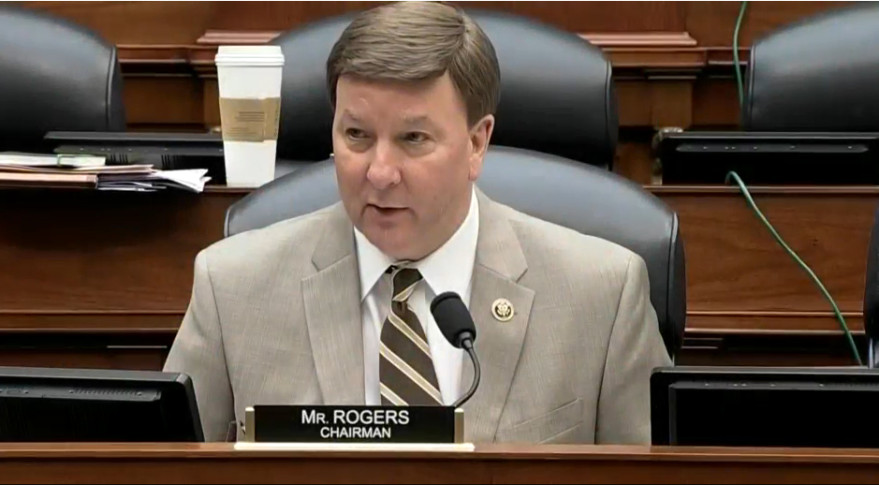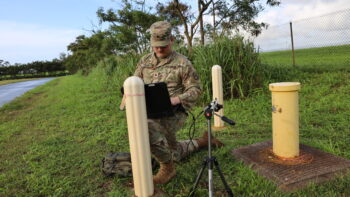
Air Force Secretary Heather Wilson and Chief of Staff Gen. David Goldfein really don’t like it. Congress appears split, with the House Armed Services Committee pushing hard for it and the Senate Armed Services Committee essentially going, really?! And Defense Secretary Jim Mattis came out yesterday against the idea, a specific provision in the House version of the National Defense Authorization Act. Here’s an independent voice, albeit a Republican one, speaking on the idea of a Space Corps. Mackenzie Eaglen, a member of the Breaking Defense Board of Contributors, is a top defense expert who works at the American Enterprise Institute. Read on! The Editor.
The recent proposal in Congress to create a new military service—the Space Corps—conjures visions of space marines and battlestars. Considering the all-encompassing duties of this service as outlined in the bill, illustrators could be forgiven for their hyperboles.
Contrary to its supporters’ claims, this is not akin to the establishment of the Marine Corps— which (similarly to the Navy) is commanded by a four-star officer serving on the Joint Chiefs, and reporting to the Secretary of the Navy. While the Marine Corps was established to solve a specific problem, the Space Corps is an answer in search of one.

Mackenzie Eaglen, defense analyst at the American Enterprise Institute.
Nor is the Space Corps the dramatic change its advocates purport it to be. It is too hastily proposed. A quick survey of the bureaucratic morass it creates proves as much.
The time is not right to establish a new service. First, nearly everything accomplished daily by America’s current space assets and personnel is in support of activities on the ground. Most notably, counterterrorism operations spanning the globe, including in Iraq, Syria, Yemen, Somalia, Afghanistan and central Africa. The Air Force’s navigation, communications, early warning and even weather satellites exist today to support ground-based operations on Earth.
Second, there is little demand for a space service other than from those who think the Air Force is a fighter mafia. Seventy years ago, Army leaders inside and outside the Air Corps recognized the importance of airpower and the need for a service to concentrate on it. In November 1945, when Dwight Eisenhower became Army Chief of Staff, he quickly set about separating the Air Force from the Army even without enabling legislation. Today, Air Force leaders claim that their ability to operate effectively in space would degrade if Congress tries to force any changes causing a break in service.
Adopting a space corps within the Air Force would likely result in a force dedicated to protecting the interests of the existing branches rather than those of the U.S. in space. The Air Force would be expected to open its basic training and academy to space recruits and cadets even while divesting itself of its space assets. By restricting the relocation of Air Force facilities, as current legislation proposes, existing bases would be divided between the two services. In some instances, the two might need to continue operating at the same facility by divvying buildings up among themselves. The result would surely be more bureaucracy rather than bolstered cooperation.
By drawing resources from the Air Force alone, the proposal for the Space Corps would exacerbate the potential for organizational conflicts. While bill language would allow the Air Force Secretary to serve as the primary Pentagon agent regarding satellites and their terminals, there are a series of large exceptions. These include programs carried out by the other military services and defense agencies such as the National Reconnaissance Office and the National Geospatial Intelligence Agency.
Oddly, Congress seeks to separate the Space Corps from other space missions including nuclear strike, missile defense and ballistic missile defense, cyber missions, and anti-satellite capabilities. This means it’s not really a Space Corps they seek to establish but a Satellite Force. And even then, it does not integrate the entire panoply of military satellites.
The House proposal seems to recognize the incompleteness of its idea by proffering a second reform: reestablishing a Space Command under U.S. Strategic Command (STRATCOM), much like Cyber Command. Space Command would unite the components of the Space Corps and the other services into a joint operating force. This is not a new idea: U.S. Space Command was first established in 1985 and dissolved in 2002 in an effort to streamline the Pentagon’s organization.
Reestablishing the United States Space Command has some merits; after all, the formation of Cyber Command has done much to increase interoperability and augment the military’s ability to operate in cyberspace. But space operations remain much more of a supporting domain than cyberspace, where opposed operations are continuous, not conjectural. Furthermore, the fundamental lesson of the decision to make the first Space Command redundant must be remembered: within STRATCOM’s many operations, it is difficult to clearly delineate which involve space and which do not.
Establishing the Space Corps and the sub-command at the same time would cause organizational pandemonium. A four-star STRATCOM commander, four-star Space Command commander, and four-star Chief of Staff of the Space Corps (to say nothing of the four-star Air Force Chief) would all be left to carve out their own responsibilities relative to each other. This would lead to stovepiping and redundancies rather than unity of effort.
Congress’ urge to get serious about space warfare is noble, but proposing a neutered Space Corps does not align with those aims. Lawmakers should adjust their objectives and instead double down on the new United States Space Command. As STRATCOM is already in the process of elevating command of space to a four-star position, service buy-in is assured. This initiative would achieve the objectives of the Space Corps without a disruptive reorganization or the dangers of overly-redundant chains of command. Creating a new senior position coupled with the current initiative to create a new branch of the Air Staff for space operations would signal to our friends and enemies alike that space is in fact an American priority without the need for further disruptive org-chart box shifting.
Let’s hope America’s space marines stay relegated to the realm of science fiction.
Israel signs $583 million deal to sell Barak air defense to Slovakia
The agreement marks the latest air defense export by Israel to Europe, despite its ongoing war in Gaza.
























